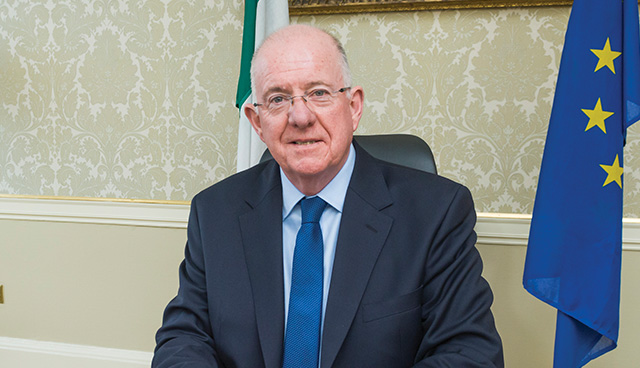Trials and tribulations: Charlie Flanagan TD


In recent years, the cycle of controversy which has dogged An Garda Síochána, combined with the ‘dysfunctionality’ of the Department of Justice and Equality, has claimed the scalps of two ministers, a secretary general and two Garda commissioners. Ciarán Galway visits the Department’s St Stephen’s Green headquarters to discuss departmental restructuring and the future of policing with Minister Charlie Flanagan.
Following a series of controversies, the Government has undertaken measures which it says will ensure the “renewal” of the Justice Department “in order to meet the changed demands of the environment in which it now operates”.
On 30 January 2018, the Government approved the establishment of an independent change implementation group, known as the Effectiveness and Renewal Group for the Department of Justice and Equality (ERG).
The ERG sought to assess progress in implementing the recommendations of the 2014 Toland Report. That particular report had recommended fundamental organisational redesign and the restructuring of the Department “into clear Justice and Home Affairs portfolios”.
“Government had decided that, in the context of modernisation and best practice, the Department of Justice required examination of a type that we are now doing. I acknowledge that we had some difficulties in the Department last year, in the provision of documentation for the [Charleton] Tribunal, [which] led to the resignation of Frances Fitzgerald, my predecessor,” explains Minister Flanagan.
The Justice Minister elaborates, suggesting that while the current focus of reform is on the Department of Justice, it is not unprecedented. Indeed, he makes reference to the restructuring of the Department of Agriculture in 1997 as well as the restructuring of the Department of Finance and Public Expenditure and Reform during the crash.
Remit
Flanagan indicates that “the sheer breadth” of the Department of Justice and Equality is a challenge. “I came in here 17 months ago, having spent three years in the Department of Foreign Affairs and experienced a department with a huge depth of influence across a range of issues and pursuits. From crime and security, immigration and integration, equality, the changing of the clocks, Valuation Office, Ordnance Survey,” he details.
Likewise, in total, the Department has a staff complement of almost 2,500 people, alongside up to two dozen agencies and bodies directly associated with the Department, with a staff complement of in excess of 20,000 people.

“There is a clear appetite on the part of everybody here in Stephen’s Green, to drive change.”
As such, the Government decided that it should pursue an examination of the role and function of the Department, in order to ensure its smooth running in the 21st century. Acknowledging “a huge commitment” on the part of the staff, the Minister asserts: “This is one of the great departments of state. [It has] served our communities [and] served our people in times of great challenge, when the institutions of the State were under threat in the 70s, 80s and 90s. Now the Effectiveness and Renewal Group is ensuring best practice.”
Restructuring
As a member of the Justice and Home Affairs Council (JHA), Flanagan travels to Brussels on a monthly basis and suggests that he is one of less than a handful of ministers who remain in charge of both justice and home affairs.
As such, while continuing to exist as a single entity, the Justice Department is being split into two distinct divisions – ‘Justice and Equality’ and ‘Home Affairs’ – each headed by a Deputy Secretary General. A functional organisational model will be adopted, with each division subdivided into five newly constituted units, each of which is responsible for the delivery of an organisational function. These five functions are: policy; governance; legislation; transparency; and operations.
“This is something that I know other departments are monitoring very closely. Of the units, the policy section and legislation will draw all of the expertise across the Department together, working under a functional unit. That will ensure that the skillset is best deployed, rather than under the traditional mode,” Flanagan outlines.
In relation to departmental dysfunctionality, notwithstanding his praise for “the service of excellent civil servants in this department”, the Minister acknowledges: “There were practices that did result in issues and challenges and hence the change.”
“The transparency function has attracted quite a lot of commentary. Having regard to the challenge that is modern day politics – the need to ensure, for example, that our freedom of information requirements are fully met. Living in a world of a 24/7 media cycle where requests from media are happening on a constant basis and they need to be dealt with both promptly and effectively.

“I am stressing, as [the Commissioner] has, the need for reform within An Garda Síochána; the need to end time-honoured practices which were neither serving the Garda well or communities well.”
“The transparency function will ensure that works to very good effect. This applies to the provision of information, for example, in response to a raft of parliamentary questions from the Dáil, reflecting, by-and-large, the adversarial nature of politics now and the need for the Department to be fit, agile and responsive.”
New SecGen
Conversely, in July 2018, the Department generated controversy by appointing a new secretary general without the position having been advertised and without the Justice Minister advising the Oireachtas Committee of a break from normal procedure.
“Aidan O’Driscoll came in; there was a vacancy at SecGen level. Aidan O’Driscoll [is] a civil servant of huge quality and experience in the Department of Agriculture. Somebody with an appetite for change, who will drive change within the Department of Justice, as well as being a fresh pair of eyes on the Department,” Flanagan affirms.
Upon O’Driscoll’s appointment, the Minister indicated: “All of Aidan’s skills and experience will be required to ensure the successful internal restructuring of the Department and an effective response to the report of the Commission on the Future of Policing in Ireland.”
Implementation
Thus far, the ERG has published two quarterly implementation reports. “Change is now being rolled out,” the Minister articulates, adding: “Within the next two years, I would foresee great changes within the Department. I don’t envisage, however, that the Department will be served by two cabinet ministers.”
In the 1990s, there was a previous experiment to split Department of Justice, Equality and Law Reform into two distinct departments. Between 1994 and 1997, Nora Owen (Fine Gael) was Minister for Justice and Mervyn Taylor (Labour) was Minister for Equality and Law Reform. However, in 1997, when Bertie Ahern’s Fianna Fáil returned to power, both departments were merged into a renamed Department of Justice, Equality and Law Reform.
“There is a limit on the number of cabinet ministries and while the Department will be ready, at some future stage, to be split into two distinct and separate departments, that will be a political decision, for some future government to take,” Flanagan maintains.
Overall, the Minister is pleased with the pace of progress on implementation. “We had the report of Kevin Toland of 2014, which again set out much of the groundwork for change. I am conscious of the fact that change is not something that will occur overnight. The workings and day-to-day operation of the Department of Justice and Equality must continue, but there is a clear appetite on the part of everybody here in Stephen’s Green, to drive change,” he says.
Future of policing
This change process, coupled with adjustments in personnel during the latter half of 2018, heralds “a really exciting time” for the Department of Justice. This incorporates the arrival of O’Driscoll as the new Secretary General, the reports of the ERG under the chair of Pádraig Ó Ríordáin, the appointment of new Garda Commissioner, Drew Harris, and also, the comprehensive report from the Commission on the Future of Policing in Ireland (CFP).
“Acknowledging what Kathleen O’Toole and her expert group have done, the important challenge for me is now to ensure implementation,” Flanagan articulates.
“The Commission sits very well with the ERG report in terms of a dynamic for change. I hope to bring to government, before the end of the year, the nuts and bolts of an implementation body under an independent chair.
“It can be a very exciting time for An Garda Síochána, a body that has suffered over the past decade in the context of a number of scandals, malpractice and the CFP report is, in essence, a world model for a best practice within a police service.”
Oversight architecture
A key recommendation of the O’Toole report is the creation of a new Policing and Community Safety Oversight Commission (PCSOC). Rather than refashioning the functions of the existing bodies, this fresh approach to oversight architecture is aimed at creating a structure in which all components have clear and distinct roles in supporting the delivery of ‘better policing’. The PCSOC is intended to supersede both the Policing Authority and the Garda Inspectorate, absorbing most of their functions.
Meanwhile, the report also recommends that an independent body, “perhaps named the Independent Office of the Police Ombudsman (IOPO)”, should be established to supersede the Garda Síochána Ombudsman Commission (GSOC).
“It’s absolutely essential that the cycle of controversy be broken and broken comprehensively,” the Minister asserts, “Independent oversight of An Garda Síochána [is] hugely important and I want to point to the success of the Policing Authority under the chair of Josephine Feehily and also the independent complaints body, GSOC.
“I will be bringing [forward] legislation shortly to strengthen the independence of GSOC and, of course, the ongoing issues of resources for both An Garda Síochána and GSOC are hugely important to me. I was pleased that both the justice budget and the Garda budget saw an increase in the order of 8 per cent under Minister Donohoe’s latest budget.”
Minister Flanagan is keen that the Commission on the Future of Policing, “unlike previous reports”, has a strict timeframe for implementation over the next three years, to be completed in 2022.
Vision
When asked about his vision for the future of policing and how radical this can be, given that An Garda Síochána remains one of the only police services in the developed world that remains in control of security and intelligence, the Minister responds: “It’s not proposed to do that. We’re a relatively small police service.”
Indeed, the O’Toole report maintains: “An Garda Síochána should retain its responsibilities for security operations, including intelligence gathering… The internal security and intelligence capacity within An Garda Síochána should be appropriately resourced and reinforced.”
Although it does note that “the national security function should not be lodged entirely within the police organisation” and advocates a “more structured, multi-agency approach to security”.
The Justice Minister primarily defines his role as ensuring that “the legislation is updated and befitting a modern society. That presents challenges across a range of criminal justice areas and also the matter of resources”.
Flanagan’s vision, therefore, is to increase Garda numbers to 21,000 by the year 2021 and “accelerate the process of civilianisation”. Suggesting that “too many of our gardaí are behind desks, involved in paperwork that can be done by skilled civilian staff”, he expresses a desire to employ 4,000 civilian staff within An Garda Síochána in the same timeframe.
The Minister also intends to reform the Garda Reserve. “It hasn’t had the impact on society or on policing that was originally intended and I’m awaiting a review of the Garda Reserve. Again, I would like to see a stronger Garda Reserve working with the sworn members of An Garda Síochána and I want 2,000 reservists by 2021.”
Culture
In the context of the findings of the Garda Cultural Audit and the appointment of Commissioner Harris, Minister Flanagan emphasises: “I am stressing, as [the Commissioner] has, the need for reform within An Garda Síochána; the need to end time-honoured practices which were neither serving the Garda well or communities well. I want to see a more transparent and a more efficient code of discipline within An Garda Síochána.”
Presently, he suggests discipline structures are “somewhat unwieldy and are not time-sensitive”, outlining a desire to see “a very strict adherence” to the Code of Ethics, across all ranks of An Garda Síochána.
“[This is] hugely important for the Garda Síochána. I am very impressed at graduation and passing-out ceremonies which I attend in Templemore, when I see ambitious, highly trained, highly motivated men and women entering the Garda service, all of whom have signed onto the Code of Ethics.
“I am concerned that the Code of Ethics has not been subscribed to fully by all members of the Garda service, I want to see that done within a strictly defined timeframe. That is something that the Commission on the Future of Policing has identified, but also, and more recently, was referred to in very stark terms by Mr Justice Charleton in his report during the Disclosures Tribunal.
“In many respects, I want to see the process of reform within An Garda Síochána accelerated and would be very keen that the many recommendations in the Commission on the Future of Policing report will be implemented over [the] three-year period,” the Minister concludes.





